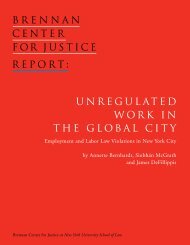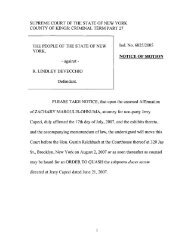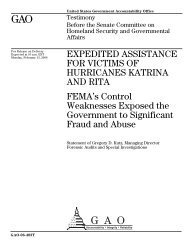Strengthening Schools by Strengthening Families
Strengthening Schools by Strengthening Families
Strengthening Schools by Strengthening Families
You also want an ePaper? Increase the reach of your titles
YUMPU automatically turns print PDFs into web optimized ePapers that Google loves.
32<br />
Bridge Builders seems to be working on both counts: reports of abuse or neglect in the three census<br />
districts served <strong>by</strong> the collaborative declined <strong>by</strong> 29 percent between 2006 and 2007, while the number<br />
of reports for the larger community district serving the southwestern Bronx decreased <strong>by</strong> only 7<br />
percent in the same period.<br />
The number of children placed in foster care in those census tracts declined <strong>by</strong> 27 percent, while the<br />
number of placements in the larger community district actually rose <strong>by</strong> 20 percent in the same period,<br />
according to John Courtney, deputy director of Bridge Builders.<br />
Two Bridge Builder staffers spend every Wednesday at Tanya’s school, P.S. 73, meeting with atrisk<br />
students and parents who have been referred <strong>by</strong> the school. On Fridays, they go to two other<br />
Highbridge schools, P.S. 11 and P.S. 126. In off hours, they’re making home visits and piecing together<br />
services, trying to provide a web of support to dozens of needy families. Bridge Builders also has a<br />
satellite office at a storefront office on Ogden Avenue, which gives parents the chance to ask for help<br />
without involving school officials. “We try to bridge the gap between parents and schools,” says Bear,<br />
who has left Bridge Builders for a job at New York Foundling, a foster care and family support agency.<br />
She says that schools sometimes “jump the gun” on reports to the state abuse and neglect hotline,<br />
particularly in the wake of a highly publicized death, such as Nixzmary Brown’s murder in 2006.<br />
Bridge Builders’ school program is part of a wider strategy designed to decrease the need for foster care<br />
in Highbridge, which has long had one of the highest placement rates in the city. Bridge Builders also<br />
offers legal advice for parents, advocates for parents involved in the child welfare system, parenting<br />
classes, outreach and a range of supports from basic food and clothing to mentoring and mental<br />
health. While the school program has a budget of $97,000, the Bridge Builders initiative has an overall<br />
budget of about $800,000, and is funded <strong>by</strong> a consortium of foundations as a five-year pilot project.<br />
One morning at P.S. 73, Bear, the Bridge Builders social worker, met with Juana, a pudgy 7-year-old<br />
with pigtails, struggling with both learning and physical disabilities. Bear had heard that Juana was<br />
good at math, so she guided her through an addition worksheet, patiently encouraging her as she<br />
counted out the answers on her fingers, and awarding her a sticker at the end. Then, gently, she posed<br />
a few questions about school and about the physical therapy exercises Juana is supposed to be doing at<br />
home. The whole process took about 20 minutes, after which Juana returned to class. Juana’s mother<br />
had asked Bear to provide her daughter extra help. But that attention ultimately helped the entire<br />
family since Bear visited the home, talked to the mom, and checked in with other siblings as well.<br />
In this case, she says, as in many of her cases, housing was also a problem. At the time, Juana’s<br />
family was seeking a transfer from their overcrowded NYCHA apartment. Bear was able to refer<br />
families to the housing branch of the Citizens Advice Bureau for help. The Citizens Advice Bureau,<br />
a community organization, operates the Bridge Builders school program under a contract with the<br />
Fund for Social Change.<br />
Not all her cases proceed as smoothly, however. Later that day, Bear met with an 8-year-old named<br />
Molly, who was quick to open up about her father’s death the summer before. She had been alone in<br />
the house with him when he had a heart attack and collapsed on the bathroom floor. Molly seemed<br />
calm, almost numb, as she recounted what happened, clearly still processing the event and adjusting<br />
to life without her father. Yet months later, Bear says she was still trying to find a grief counseling<br />
program for the girl. In the meantime, other problems at the home became painfully apparent.<br />
During an unannounced visit, she found the apartment rife with roaches, trash and dog feces. When<br />
Molly’s mother, who was pregnant and has two other children, repeatedly failed to acknowledge any<br />
problems in her home, insisting that everything was fine, Bear made the difficult decision to call the<br />
State Central Register. “If the parent’s not willing to get help and the conditions are in fact neglectful,<br />
there’s really no other choice,” Bear says.

















